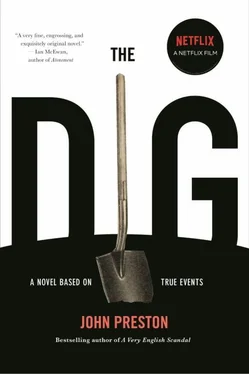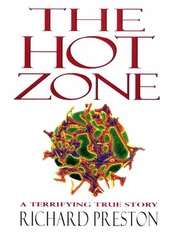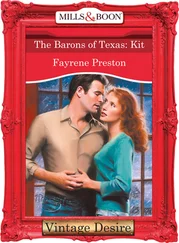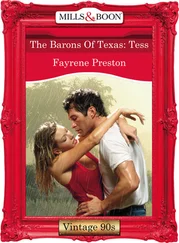“Very much so,” I said.
“I am glad… I think it has gone as well as could have been expected.” Her eyebrows rose fractionally. “Bar the odd intrusion.”
Unusually for him, Robert stood quite still by his mother’s side, not saying anything.
“Hello there, young man,” said Mr. Brown.
Robert looked up at him. He seemed to be coming to a decision. “Hello, Mr. Brown,” he said.
People were already beginning to leave. They came to say their goodbyes to Mrs. Pretty, queuing up to thank her for her hospitality, before drifting away. Lengthening shadows undulated across the cropped grass. It wasn’t until most of the guests had gone that Rory asked, “What are you planning to do now?”
“I don’t know,” I told him. “I hadn’t really thought.”
“It’s just that I wondered if you had any plans.”
“Plans?”
“For later. I thought perhaps you might like to go for a walk in the woods. To see if we can hear a nightingale. I can’t promise anything. As I said before, it’s a bit late in the year for them now. But you’d be very welcome to come along, if you like.”
“Yes,” I said. “I would like that.”
“You’d have to change first, of course. I mean, you couldn’t possibly go tramping about like that.”
“Couldn’t I?”
“Absolutely not. You’re far too smart. I should bring a sweater too, if I were you. It can turn quite chilly after the sun has gone in. Why don’t we meet outside the squash court at, say, eight o’clock?”
“At eight, then,” I said.
When I arrived at the squash court, Rory was already waiting. He was wearing a long herringbone overcoat I had not seen before, along with his Irish tinker’s cap, worn the right way round this time.
“Hello,” he said, and held up a thermos flask. “I’ve brought along some coffee to keep us going.”
There was a cinder path that skirted the house and crossed the top of a meadow — it must have been a meadow once, although now it was choked with bracken. Running along our left-hand side was a white paling fence. I smelled the sweet, louche smell of gorse, then honeysuckle, and then, just as intensely, wild garlic. The smell was so strong that someone might have rubbed their hands together and opened them right under my nose.
Rory turned on a torch.
A wand of light illuminated our way. At the end of the cinder path was a stile leading into a wood. When we were on the other side he said, “Everything becomes much steeper from now on. Be careful where you put your feet — there are rabbit holes all over the place. And do remember to watch out for brambles, won’t you?”
We descended through the trees, our footfalls giving out muffled thumps. The torch beam swung about. I couldn’t see the river — not from here — but there was a cool breeze blowing up the slope. The smell was quite different now, although almost as strong. Dry sand overlaid with the tang of pine.
I stumbled and, without meaning to, cried out.
“Here,” said Rory. “Take my hand. Just for this bit. Until it becomes flatter.”
I scarcely hesitated before putting my hand in his. Yet once I had done so, I felt as if my entire being had become concentrated in my fingers. After we had been going for a few minutes the ground leveled off into a narrow shelf that ran along the side of the bank.
“Why don’t we try here?” he said, and released my hand.
We both sat down. The ground was covered with dead leaves. They were quite dry — it was like sitting on a mound of kapok.
“Cup of coffee?”
Although I didn’t want any, it seemed churlish to refuse after Rory had taken the trouble to bring it. He poured out a cup and passed it to me. The coffee tasted vile, like burnt biscuits, but I drank it anyway.
“Aren’t you having any?” I asked.
“There’s only the one cup. I forgot to bring another one. Stupid of me.”
“Have some of this.”
“No, no. Honestly.”
“But I insist,” I said, and handed the cup to him.
He drank what was left and then poured himself some more. When he had finished, he pushed his cap back and turned off the torch.
“All we can do is wait and hope we’ll be lucky,” he said. “Most of the nightingales have paired off by now. There are just the odd few left. The unlucky ones. Mind you, they say that desperation makes them sing all the harder.”
We sat in silence. Rory leaned back with his head resting against the trunk of a tree. I was sitting up with my arms clasped around my knees. Through the trees I could see narrow streaks of silver where the moonlight hit the water.
After a while he said, “Do you know this part of the world?”
He sounded so solemn that I almost burst out laughing.
“No,” I said. “I’ve never been here. Not before.”
“The first time I came here, I didn’t think much of it. All flat and featureless. When people said how much they liked it, I couldn’t understand what they meant. But it rather steals up on you. Perhaps it’s the lack of variety that makes you notice things more.”
“What sort of things?”
“Oh, I don’t know really. Small things. Things that might otherwise pass you by.”
“Where were you brought up?” I asked.
“Essex,” he said. “Near Chelmsford. Do you know it?”
I shook my head.
“That’s pretty too, of course. But in a different sort of way. They grow a lot of fruit round there. For jam,” he added, almost as solemnly as before.
“Jam?”
‘That’s right.”
A few stars had appeared above the tops of the trees. Down below, the foliage was too dense for any light to penetrate. Everything was quite black.
“What about you?” he said.
“What about me?”
“Where do your people come from?”
“I’m not really sure if I have any people,” I said.
“How do you mean?”
There’s something about the darkness that invites confidences, of course. Or draws them forth without one realizing. Almost before I was aware of doing so, I found myself telling him how my father had died when I was very young. And how the four of us — my two sisters, my brother and myself — were taken in by my uncle and aunt.
“Did your father die in the war?” Rory asked.
“No,” I said. “No, he didn’t. He drowned. We went on holiday to Cornwall. He had petit mal. He’d had it since he was a boy. He must have had an attack while he was swimming. I saw him being pulled out of the water. They tried to give him mouth-to-mouth resuscitation, but I think he was probably dead by then.”
“That must have been very hard for you.”
“It was a long time ago now.”
“But what about your mother?”
Closing my eyes, I felt as if I had been transported to the top of a cliff. A chalk cliff, high above the sea, with a great wilderness of blue laid out before me.
“My mother ran off with an army doctor a few months before my father died,” I said.
Rory didn’t reply, not immediately. I wondered if he disapproved — either of my frankness or my circumstances.
“Did she die soon after that?”
“No,” I said, “she didn’t die.”
“I don’t understand.”
“She just didn’t want to see us any more.”
“You mean you’ve never had any contact with your mother?”
“Never. But I believe she lives in London.”
“I see… And how did your uncle and aunt treat you?”
“They were very kind,” I said automatically. But even as I was saying it I found myself remembering the swing door that separated their part of the house from ours and the reproving shush it made whenever it closed. I remembered, too, waking up and seeing a charity box on our bedroom mantelpiece. A cast-iron figure of a little black boy with “For Foundlings” printed on the base. I always assumed this must refer to us.
Читать дальше












